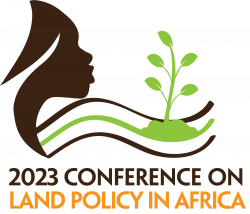Unlocking the Potential of Digital Agriculture: the nexus between intra-Africa Trade and Land
By Tsotetsi Makong
Chair, Scientific Committee, 2023 Conference on Land Policy in Africa
The AfCFTA holds the potential to lift 30 million people out of extreme poverty, boost Africa's income by USD 450 billion while connecting 1.3 billion people.1
Consequently, its importance cannot be overestimated. This notwithstanding, intra-Africa trade in the broader continental drive to deliver on the AfCFTA promise of integrated continental market is not without context. The youth bulge, ever accelerating digitization including in agriculture, as well as centrality of land in development prospects of the African continent are collectively key to delivery of this promise. The intersection of the AfCFTA, digital agribusiness, the dynamic of growing youth population, as well as land as a critical resource for fostering economic integration is worth considering.
With a median age of 19.7 years, Africa has the youngest population in the world and by 2050, one in three young people will live in Sub-Saharan Africa. More than 60% of Africa's population is under the age of 25 and by 2030, young Africans are estimated to constitute 42% of global youth.However, there is a mismatch between this young population and available opportunities.2 To this end, annually, 10 to 12 million young Africans enter the job market yet only 3 million of formal jobs are created each year.3 This is a significant factor that must inform conceptualization of implementation aspects of the AfCFTA at national, regional and continental levels.
Overall, 40-63 per cent of young Africans engaged in some type of agriculture.4 This is in the overall context entailing that more than 60% of the population of Sub-Saharan Africa is smallholder farmers. At the same time, agriculture and agribusiness in Africa are expected grow into US$1 trillion industry by 2030. This represents more than half of the GDP of the Sub-Saharan Africa.5 Coupled with the population budge, this makes a case that the confluence of population growth, increasing involvement of the youth in agriculture can align to maximize youth population dividend. The various instruments of the AfCFTA can play a facilitative role to mid-wife this dividend. This is through elimination of duties across African countries as well as addressing non-tariff barriers by the AfCFTA instruments. These represent important regulatory solutions and infrastructure to enable cross-continental trade in goods and related services.
One important AfCFTA legal instrument that can accelerate trade in agriculture as well as youth employability is the Digital Trade Protocol that is currently under negotiations. With the millennial generation having lived through the continent's meteoric rise in mobile and internet penetration rates,6 the cross-pollination of agribusiness and the 4th industrial revolution is not an option. This is in line with the Digital Transformation Strategy for Africa (2020-2030) bid for Africa to make digitally enabled socio-economic development a high priority'. Specifically, riding on the AfCFTA legal infrastructure, deployment of digital technologies in relation to services related to market linkages and crop-based advice for farmers will represent a huge win for the continent.
In view of the foregoing, the intersection between intra-Africa trade, exploiting potential youth dividend and digitization in the overall context of the AfCFTA is critical for the continent. At the same time, given that access to land is a matter of domestic regulation, countries should rationalize the interface between land based investments against the potential solutions and opportunities cited above. Both domestic and foreign direct investments that are key to unlocking productive capacities of African countries and render cross border trade viable are possible through friendly land governance system. This mean to a greater degree, also the viability of the AfCFTA depends on the extent to which land governance systems of individual countries are investment friendly. The nexus between land governance and AfCFTA's viability requires deeper exploration. This is with a view to reconciling domestic land governance preoccupations against pursuit of continental economic integration through the AfCFTA. There is an urgent need to foster forum coherence across various continental bodies to ensure that synergies across various policy areas, continental, regional and national levels are reconciled and fully understood.
1AfCFTA Secretariat (2022) 'Africa Continental Free Trade Area: Factsheet' African Continental Free Trade Area Secretariat, Accra.
2ADF 'Experts Say 'Youth Bulge' Can Promote Security and Prosperity in Africa' available at https://adf-magazine.com/2022/08/experts-say-youth-bulge-can-promote-security-and-prosperity-in-africa/ (accessed 18 November 2023)
3AfDB (2018) Jobs for youth in Africa AfDB, Abidjan.
4 Haley J. Swedlund and Maya Turolla 'Understanding youth in Africa beyond age' available at https://blogs.lse.ac.uk/africaatlse/2022/09/16/understanding-youth-in-africa-beyond-age/ (accessed 18 November 2023)
5World Bank 'GDP (current US$) - Sub-Saharan Africa' Available at https://data.worldbank.org/indicator/NY.GDP.MKTP.CD?locations=ZG (accessed 18 November 2023)
6World Economic Forum 'Why Africa's youth hold the key to its development potential' available at https://www.weforum.org/agenda/2022/09/why-africa-youth-key-development-potential/ (accessed 18 November 2023)
